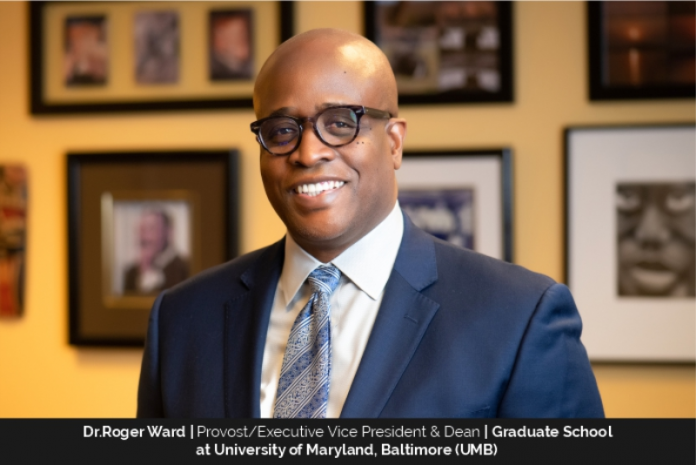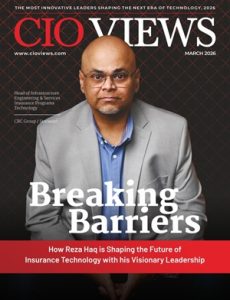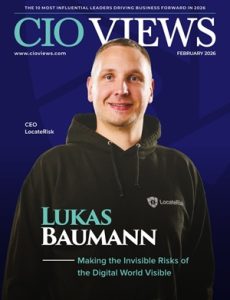Roger J. Ward, EdD, JD, MSL, MPA, is the provost and executive vice president of University of Maryland, Baltimore (UMB). He is focused on ensuring that the University’s mission and vision are accomplished. He joined UMB in March 2009 as associate vice president for academic and student affairs, and he was named to his current role in October 2021.
Dr. Ward reports directly to the president. “The provost is second-in-command at the University,” he points out. While the president is more externally focused, involved in fundraising, friend raising, community relations, and engaging with state and federal legislators and leaders, the provost is more internally facing. Ward ensures that the academic enterprise is functioning well, remains well-resourced, and is focused on its mission.
Joining the Education Industry
The education industry was not Ward’s original career choice. He does not like to say that he came into it by chance. “I evolved into it,” he says.
When he first came to the United States, it was solely for the purpose of getting a college education and returning to his native country, Trinidad and Tobago. Initially, he was interested in engineering, and the first program he enrolled in oriented that way.
Eventually, at the institution where he was admitted, he realized that he could not afford to be there as an international student, so he transferred to a community college, where the tuition fee was half of what it would have been at the four-year institution.
His major was data processing and computer programming. “I enjoyed that. Computers were becoming more and more mainstream,” Ward points out. He thought that an education or a career in computer programming or computer information systems would be useful for him, and he went on to earn an associate degree in data processing and computer programming.
While he was a student at Kingsborough Community College in Brooklyn, N.Y., he got involved in student government and a peer advisor program, which connected him to the vice president of student development and dean of students.
And because he was very involved in student government, Ward got to know the president of the college and the chancellor of the university system. “I got a really good understanding as a student of the various dimensions of higher education,” he says. “I got some insights into how universities work and what they are about. I found it intriguing.”
After Ward graduated from Kingsborough CC¸ he attended John Jay College of Criminal Justice in New York City. He says that by then he had developed much more interest in the public policy space. At John Jay College, he earned a bachelor’s degree in government and a master’s in public administration.
“Just as I was graduating with my master’s in public administration, I remember sitting at my desk at a company called NovaWorks Computers, and I was not sure whether I wanted to continue working in the corporate space,” Ward recalls. “It was not my cup of tea. I was thinking, ‘How could I leverage the credentials I had?’”
Ward picked up the phone and called the vice president of student development at Kingsborough CC, who had become his mentor, and said, “Hey, I just graduated with my master’s in public administration. Is there an opportunity at Kingsborough that I might be able to step into?”
Fortunately for Ward, there was an opportunity, and that is how he got into higher education.
Journey with UMB
Ward has held several different roles at UMB over the years, including senior vice president for operations and institutional effectiveness, chief accountability officer, vice president for academic affairs, and dean of the interdisciplinary University of Maryland Graduate School, a role he assumed in January 2020.
“Universities do not transform overnight or in a decade,” he notes. “But people within the institutions and organizations do, even though they don’t transform radically.” Processes, approaches, and standards do evolve. “We have evolved — and some of that has to do with the leadership of the institution,” Ward says.
The current president of UMB, Bruce E. Jarrell, MD, FACS, took over in January 2020, so for more than two years, Jarrell’s and Ward’s focus was on how UMB’s six professional schools and Graduate School could survive the COVID-19 pandemic and thrive in the aftermath.
“We are coming out of that, and I am in conversations with the president about what our focus should be on as an institution,” Ward says. They are also thinking of what the post-pandemic higher education landscape will look like and how they can prepare UMB for that reality.
Coach at Heart
Ward is a coach at heart and loves developing people. He coaches girls’ basketball at the club level, using the opportunity to share his experiences as an educator. Through sports, he helps the girls grow and learn about adversity, bouncing back from losses, teamwork and camaraderie, and practicing hard to get what they want.
“I enjoy bringing that to my work, too,” Ward says. “I like to hire good people. And when I hire them, I like to provide them with professional growth and development and offer them opportunities to flourish, as well as providing the support and resources they need. I just let them do their thing.”
Ward also likes to create a vision and inspire people to embrace that vision. He inspires and encourages people to rise above their own self-interest and do what is in the best interests of the institution.
Ward does not have a typical workday. He points out that there is no typical workday in higher education. “It is just not the nature of academia,” he says. An accountant or someone in a technical job may have a typical day, but not Ward, because his is a student-facing and faculty-facing position. “And that is why I like working in higher education. It is never routine, and it is never typical,” he adds.
He regularly has meetings with the president, deans, and vice presidents. He says that he does not meet with students as much as he used to when he was directly overseeing student affairs. Much of Ward’s time includes thinking of new program development, faculty development, fundraising, strategic planning, risk management, accreditation of the institution, and enhancing its reputation.
Greatest Achievements
Ward has made sure to leave every institution, and the position he held, in a better situation than when he started. “I brought innovation to it. I’ve helped move important agendas forward,” he says.
He has left the constituents that he was set up to serve in a situation where they are better served than before — for example, opening the campus center at UMB and establishing a university wide student development program that now it is a model for graduate and professional education. “Those are all accomplishments, no question, but I cannot pick one that I’m most proud as an accomplishment, per se,” Ward says.
“I think of accomplishments in terms of the impact I had in the roles I have had,” he adds. “The things that I’m most proud of I can cite in every role I had — the impact I had at a very holistic level in that role.”
‘The University’s Plans Are My Plans’
Ward’s plans for the future include helping UMB achieve its strategic priorities. “And the University’s plans are my plans,” he says. “I don’t have any isolated individualized plans or anything that is not articulated in the University’s strategic plans.”
He believes that if he is to succeed, he cannot have any plan that is not shared by others. It is because the educational institution requires collaboration.
And, for Ward, success has always been about helping institutions achieve their goals, objectives, and priorities in pursuit of their mission. He points out that higher education institutions are mission- and vision-focused. And, as a leader, he believes that success comes when institutions achieve their goals.
“When I think about whether I’m being effective or successful or not, I think in terms of my own contributions and helping institutions get to those priorities,” Ward says.
As a leader, Ward also is very focused on outcomes. He is always trying to figure out what things need to be done to reach a certain a point — that imagined place of success.
“To improve the human condition and serve the public good of Maryland and society at-large through education, research, clinical care, and service.”
Message to Aspiring Leaders
Ward points out that sometimes aspiring and emerging leaders come into an organization and have the ambition of moving up. Their eyes are focused on the positions above them. His advice to them: “Excel where you are.”
“Do what you are hired to do, and do it exceptionally well, first and foremost,” Ward says. “When people realize what your abilities are and what value you add, opportunities will present.”
That is what happened to him.
“Be the best where you are, the position you are in — the position you play — and the rest of it will take care of itself,” says Ward, who passes on this message to his kids as well when he coaches them.
Young and emerging leaders can have ambitions and think ahead of what they aspire to, but they should not neglect where they are, Ward says in his message. He speaks from experience, as he has seen too many leaders fail in that respect.
Ward narrates an African parable about a dog with a bone to stress his point: A dog is given a little bone and is asked to take it safely to the other side of a pond. As the dog is crossing a bridge over the pond, he looks over the edge, and doesn’t realize that he was looking at his own reflection in the pond. In the pond, he saw “a bigger dog with a bigger bone,” and he said, “I want that bone because that is bigger than my bone.” So, he dropped his bone and tried to grab the bone he was seeing in the pond. He lost his bone, and the new reflection he saw was of a dog with no bone.
“So, the idea is, as you are aspiring to get your bone as big as possible, be careful that you don’t end up losing everything because you are not taking care of what you have and making the most of it,” Ward says. “The rest of it will take care of itself.”
In addition to excelling, aspiring leaders need to find ways to document their accomplishments and what value they add. “So, we can recognize you, celebrate you, and promote you,” Ward suggests in his message. “Don’t just leave it to chance.”
He adds: “Excel where you are and then find ways to make people aware of what your value is to the organization.”





